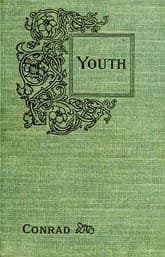Youth
Critique • Quotes
 First edition, 1902
First edition, 1902First publication
1898
Literature form
Story
Genres
Literary
Writing language
English
Author's country
England
Length
Approx. 14,000 words
The hard-won romance of youth
"Youth" is probably Joseph Conrad's most anthologized short story and has been for most of its existence. It's easy to see why.
It's a great story of adventure on the high seas that also manages to capture a more universal human experience—that of passing through exultant but fleeting youth.
That's "adventure" in the broadest sense. No kidnappings, no treasure seeking, no gold-laden galleons beset by pirates. No pitched and pitching battles of broadsides and swooshing sabres.
Rather, one disaster after another afflicts the Judea, upon which twenty-year-old Charles Marlow is serving as second mate on his first trip to the Far East. Trouble starts before the ship is even out of the harbour when it runs into a small boat. It dogs them throughout its voyage, as storms demolish everything above deck and fire threatens to sink the rest from under the crew's feet.
At several points it seems impossible they'll survive but for the most part they respond to the dire crises with superhuman responsibility and courage. And the effect on Marlow is even more unexpected: he is tired and sorely tested but he is also thrilled with the great, well...adventure he's having. The worse things get, the fonder he becomes of the damaged old ship. The more alive—and the more in love with the life at sea.
Nostalgic narrator
The concluding episode of the journey may be a humiliating letdown for veteran sailors but for Marlow it's a triumph of almost spiritual dimensions.
Or is it? After all, the story is being recalled in these terms by an older Marlow. He's recounting it to his middle-age friends who all once had seafaring in their blood but have become professionals of the landlubbing middle class.
The details of what happened twenty-two years earlier are related in simple, direct terms, but much of the romantic feeling attached to those events comes from the older Marlow's nostalgic interpretations. The exclamations of "O youth!" and his description of his younger self's awakening could only come from an older man. Note how he describes the sudden formation of a lifelong attachment to the East:
I have known its fascination since; I have seen the mysterious shores, the still water, the lands of brown nations, where a stealthy Nemesis lies in wait, pursues, overtakes so many of the conquering race, who are proud of their wisdom, of their knowledge, of their strength. But for me all the East is contained in that vision of my youth. It is all in that moment when I opened my young eyes on it. I came upon it from a tussle with the sea—and I was young—and I saw it looking at me. And this is all that is left of it! Only a moment; a moment of strength, of romance, of glamour—of youth!...A flick of sunshine upon a strange shore, the time to remember, the time for a sigh, and—good-bye!—Night—Good-bye...!
But recognition of this narrative spin does not cast doubt upon either the story's details or the insights elicited. Part of the elusiveness of youth is that we all go through it without realizing its specialness and blithely unaware of how quickly it dissipates.
It takes an unusually reflective older person to try to recapture and reinterpret those moments to find the emotional truths in the challenges of youth.
— Eric
Critique • Quotes

